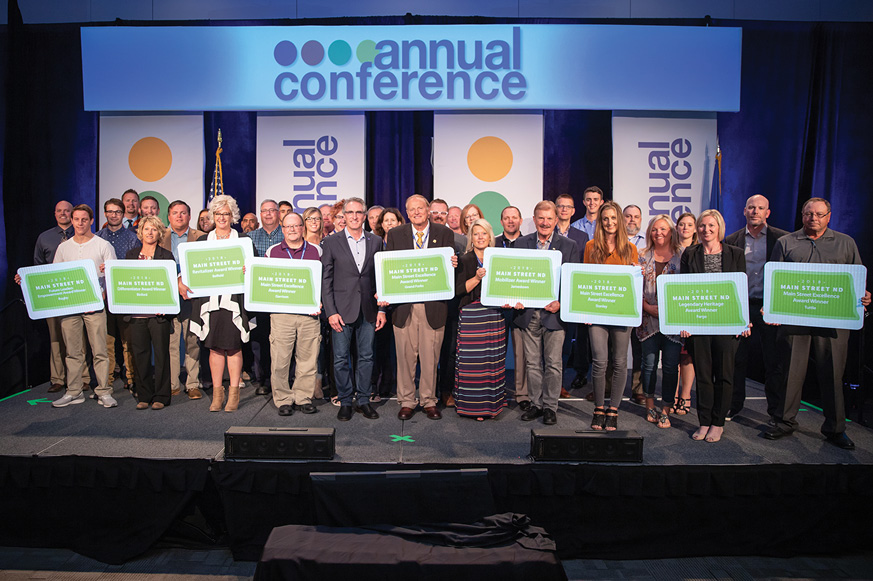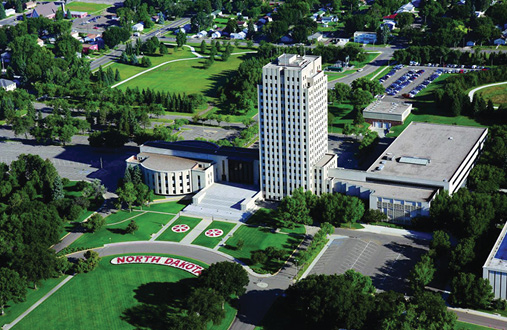- Home
- Media Kit
- Current Issue
- Past Issues
- Ad Specs-Submission
- Ad Print Settings
- Reprints (PDF)
- Photo Specifications (PDF)
- Contact Us


![]()
ONLINE

Innovating
for the Future
Editors’ Note
Doug Burgum took office as the 33rd governor of North Dakota on December 15, 2016. Burgum’s small-town upbringing and agricultural roots laid the foundation for his shared values of respect for the past, gratitude for the present and inspiration for the future. Driven by a strong belief in North Dakota’s people and a powerful dream, he returned to his home state and helped lead Great Plains Software from a small startup company in 1983 into an award-winning tech firm that employed thousands of team members from more than 220 cities across North Dakota. Burgum led Great Plains as CEO through its initial public offering in 1997 and acquisition by Microsoft Corp. in 2001. He remained at Microsoft as Senior Vice President through August 2007, helping the company stake a leading position in the global business applications software industry. In 2006, Burgum reaffirmed his passion for North Dakota by founding Kilbourne Group, a real estate development firm committed to creating smart, healthy cities through vibrant downtowns. The company’s substantial impact on revitalizing downtown Fargo inspired his Main Street Initiative. In 2008, Burgum co-founded Arthur Ventures, a venture capital firm that invests in ambitious, mission-driven software companies. The success of those people and businesses guided by Burgum’s leadership and inspiration has created billions of dollars of shareholder value and thousands of jobs. In 2009, then-Governor John Hoeven awarded Burgum the Theodore Roosevelt Rough Rider Award, North Dakota’s highest citizen honor. The award recognized Burgum for his business leadership and numerous philanthropic efforts, including the Doug Burgum Family Fund, which focuses its charitable giving on youth, arts and education. Burgum grew up in Arthur, North Dakota and has maintained his commitment and connection to his roots through family farm partnerships, by serving as a member for Arthur Companies, Inc., a diversified agribusiness company founded by his grandparents in 1906, and through a ranching partnership in the Badlands of western North Dakota. He graduated with a bachelor’s degree in university studies from North Dakota State University in 1978. He earned an M.B.A. from Stanford Graduate School of Business in 1980.

The Governor with award winners
at the Main Street Award Ceremony
What interested you to become involved in public service?
The interest has always been there, be it in the private sector or the public sector. As Teddy Roosevelt said, the great prize in life is the opportunity to “work hard at work worth doing.” Maybe it was something my parents instilled in me, but it was the idea that I was going to put a lot of hours of work into my career, so I should make sure that what I was doing had purpose and was fulfilling.
I always thought the private sector and the work we did there was incredibly fulfilling in terms of our mission to help people and organizations realize their full potential and help customers and partners improve their lives and business success. I felt I was working on things that were making a difference. In North Dakota, there is a long tradition of people going directly from the private sector into the governor’s role, so when the seat opened and timing was right with my youngest graduating from high school, I felt that this was an area where I could have an opportunity to do work worth doing and really make a difference for the people of North Dakota in a state I really love.
What is your approach to state government?
Everything we do in state government, we do with a shared purpose: to Empower People, Improve Lives and Inspire Success. Combined with our shared values of gratitude, curiosity, humility and courage, we’re working to develop a positive and innovative state government culture in North Dakota. We aspire every day to work as one, maintain a citizen focus, approach problems with a growth mindset, apply leadership everywhere and make a difference.
These values are applied every day as we make progress on our five strategic initiatives: reinventing government, strengthening tribal partnerships, addressing behavioral health and addiction, transforming education and helping to build healthy, vibrant communities through our Main Street Initiative.
What were your key priorities when you took office?
It was an interesting time to take office because, in December of 2016, we were in the middle of several crises – one was the incredible drop in oil prices and a simultaneous drop in agriculture commodity prices, so our two primary industries had collapsed.
Everything we do in state government,
we do with a shared purpose: to Empower People, Improve Lives
and Inspire Success. Combined with our shared values of gratitude, curiosity, humility and courage, we’re working to develop a positive
and innovative state government culture in North Dakota.
We had to take a general fund budget from $6 billion down to $4.3 billion. Our legislature only meets for 80 days every two years, so we had an enormously challenging time making that happen and making sure we were meeting the essentials of delivering services from government.
We also had 8,000 people camping illegally on federal property in North Dakota related to the Dakota Access Pipeline protest, so we had to try to peacefully unwind those, which took a lot of engagement with the tribes in North Dakota. That turned out to be successful, but it took us our first 76 days in office. From there, we had to work to rebuild and strengthen the tribal relations with the sovereign governments that share land within our borders.
We had those two things going on and then had to deal with every aspect taking place across the country. In every state, people are dealing with big challenges in K-12 and higher education because of the technological, demographic, economic and cultural changes that are affecting how we think about education, so there are some big, unstoppable forces impacting that.
Also, like everyplace else, we have the crisis around the disease of addiction and trying to raise awareness of that critical issue and eliminate the shame and stigma associated with it.
We also have the workforce issue because, for the first time in the history of the country, we have more jobs available than people seeking jobs, so we had to prioritize resolving that. Our approach was understanding that workers choose where they want to live first and get their jobs second. Our workforce initiative is built around our Main Street Initiative, which is built around healthy, vibrant communities that have smart infrastructure and are designed in a way that keeps property taxes down.
We had plenty of things to pursue and we have spent the past two years making progress in all of those areas.

North Dakota’s State Capitol complex in Bismarck
What needs to be done to truly transform K-12 education?
We issued an executive order to form a task force on innovation in K-12 education. We tried to pull together a consensus from frontline leaders who represent all the groups – parents, the private sector, school administrators, etc.; there are many stakeholders, and we need to have them all at the table.
We also convened two statewide innovation in K-12 conferences where we have had great turnouts and tried to take a look at best practices and shining a light on innovative practices that are happening.
At day’s end, we have to empower people on the frontlines because we have teachers who want to figure out ways to innovate. We have to ensure that we are empowering local school districts and getting rid of obstacles that get in the way of local leaders and teachers driving innovation.
We are excited about what we see from the folks who are on the front end of that, who are driving that change from within, and we are going to keep supporting them, both with recognition and conferences, but also by eliminating obstacles and creating policies to accelerate innovation.
What are the keys in such a partisan time to bring people together and drive change?
The states are where change can happen. We have developed a list of about 50 different areas where one can incubate democratic ideas at the state level.
Coming from the tech sector, I like to think about it as 50 platforms for innovation. Each state has a chance to out-innovate the others. In North Dakota, we have tried to focus on innovation and not regulation because regulation is, by nature, backward-looking. If someone has an issue, they try to get a law passed. It takes a few years to figure out how to implement the rule, then we have to hire inspectors to make sure we’re complying with the rule. Pretty soon, we have gone eight years before the problem can be addressed.
We’re always trying to get ideology out of the room and get the data into the room, and then look for new solutions.
The states really have an opportunity to collaborate and work together for the benefit of their citizens, and if we can get the data in the room and get the ideology out of the room, a lot of progress can be made.
Is it critical to engage the private sector in these issues and how important has it been to build a strong public/private partnership?
It’s absolutely critical because the engine of the economy and the revenues that drive our state all come from the success of the private sector. Making sure that we are supporting it and creating an environment where the private sector can thrive is essential.
Having an opportunity to work with corporate officers for one of the world’s most successful companies, we know what goes on in the boardroom in terms of how capital and talent get deployed across borders. Working with everyone from the small businesses and entrepreneurs to the largest businesses that work in the state and understanding how entrepreneurship works is an invaluable background to have.
In North Dakota, the governor can chair a number of different commissions because our state has a state-owned bank and state-owned mill and elevator, for instance, so involving the board chairman experience is really valuable.
Are you able to enjoy the process and take moments to celebrate the wins?
There have been a number of things that are happening that are enormously satisfying. With the work that the First Lady has courageously undertaken on the disease of addiction and her progress in working with people overcoming these challenges so that they are now years into recovery, it has been moving to see how that touches people.
We haven’t done a lot of celebrating, but there have been some quiet moments where the First Lady and I, along with Lt. Gov. Brent Sanford, realized this is work worth doing because we are making a difference in people’s lives. It’s easy to go to work every day when we can have that kind of positive impact on people.![]()